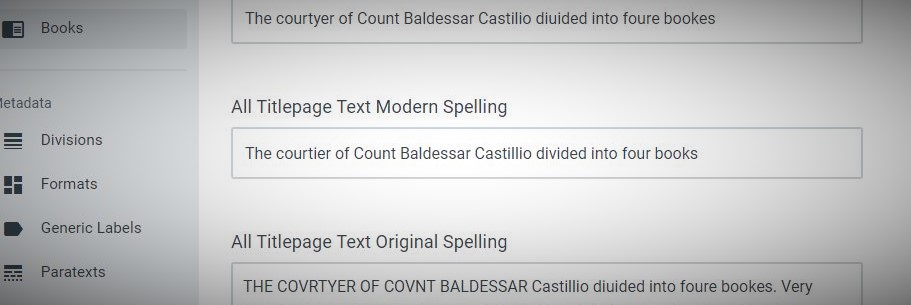
Database
The chief collaborative output of the Civility project will be the creation of an open-access database of all courtesy and conduct books published in England between 1500 and 1800. Although several extant sources detail the fortunes of certain sub-sets of conduct books in the early modern period, no one has yet mounted this data in a single digital repository.
Beyond enabling our own investigations into the patterns of translation, publication, marketing, and commercial reception of conduct books in England, the Courtesy and Conduct Books database is also intended for use by students and scholars around the globe. The goal is to create an accessible repository of data which researchers at every stage can draw on to formulate new insights on the nature and importance of conduct books in the intellectual and cultural milieu of early modern Europe.
-
FAQ
What are the parameters of the database?
Our database will focus primarily on the English book trade and on a specific genre of writing, while including consideration of translations and adaptations of conduct literature for the French market. The database will cover the period of 1500-1800 in England, before the advent of industrial-scale printing.
What sources will the database draw on for data?
The Courtesy and Conduct Books dabatase will take inspiration from existing large-scale databases such as DEEP (the Database of Early English Playbooks), whilst adjusting the data fields to suit the requirements of the courtesy book genre. Our primary digital sources for data are the English Short Title Catalogue (ESTC), the Universal Short Title Catalogue (USTC), Early English Books Online (EEBO), and Eighteenth Century Collections Online (ECCO).
Who will enter the data?
Our two researchers, Erzsi Kukorelly and Emma Rayner, will be responsible for entering metadata concerning translation, publishing, marketing, and ownership. This work will be facilitated by training at the Digital Humanities Summer Institute at the University of Victoria, British Columbia, Canada, and Rare Book School at the University of Virginia, USA. Emma will be responsible for entering data for the period 1500-1660, whilst Dr. Kukorelly will be responsible for entering data for the period 1660-1800.
What kind of data will the database hold?
Our database will operate according to a “books as objects” ethos, meaning that we’re less interested in the content or aesthetic value of the texts we enter than in the material details of their production and transmission. This database, which we estimate will contain around 1500 entries, should provide literary scholars, historians, and bibliographers with new insights into marketing strategies used by early printers and stationers, sales patterns, and the reception history of both well-known and little-studied advice literature.
By inputting the number of new editions of each text we will gain insight into how well individual titles sold, and will be able to observe what correlation, if any, exists between marketing devices used and the number of editions issued. Equally, by observing available pricing data or the format and number of sheets of paper used to make these books, we will gain new knowledge about the financial accessibility of these texts at different points between 1500 and 1800. When present, readerly annotation in extant copies and the binding of conduct texts with other titles will also be recorded and analysed for the clues they offer about how the books were used by early owners.
